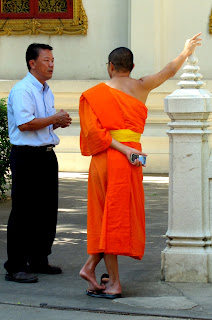For my first few days in Cambodia, I let its third-world status get to me.
The smell here is terrible; the inside of the house is plagued by garbage waftings. Every room is unbearably stuffy—even in this winter season—and there are flies. I average killing six mosquitoes in the shower every day (today I got eight—naked ninja!) and I sleep on a pallet on the floor with no pillows or sheets.
As I toured the genocide museum and the killing fields, even as I met Vietnamese and Chinese refugees living on the Mekong—even then I thought, “I can’t wait to get back to Thailand.” “I miss Korea and its silliness.” “I wish my parents were visiting me now instead of in two months.”
Then I thought about dad wrestling with my sister and me on the living room floor while mom refereed. I remembered coloring the songs my mom practiced her violin for the next concert. I felt the last hugs my parents gave me before I got on the bus for first grade, before they left me behind at college, before I got on a plane for Korea.
These memories are big no-no’s on the best of days, surrounded by the happiest of people. But I’m surrounded by the unloved, the girls who declare they love me—write me notes, bedeck me in pink paper crowns, whose faces fall, even though they knew it was coming, when I admit I’m leaving tomorrow.
They’re sad that I’m leaving—I who checked out before I came, I who spent the last couple of days touring and eating at swanky restaurants and who wanted my alone time last night. Imagine if my parents were here.
Imagine my dad—who always said God blessed him with girls because he wouldn’t know what to do with boys—giving out bear hugs and gentle tussles. Imagine my mom, towards whom shy kids helplessly gravitate towards, reading “I Love You Forever” with these skinny brown girls with big eyes, who sit on the stairs behind a wall when visitors come in.
They’re too shy to hug you on the first day, but on the second day after a water fight or on the third day after a fierce game of “Ninja,” maybe they’ll sit nice and close to your left elbow, sharing crayons with you as the mosquitoes tickle your ankles.
I’m feeling very small here on my pallet on the floor with now sheets or pillows. Too small to change anything or to make the big difference. Too small to figure out what the next step is, what needs to happen, what’s the simplest way to go from A to B with the fewest mishaps and the most children safe, schooled, and happy.
 |
| I take you guys with me everywhere, mom and dad. |

























